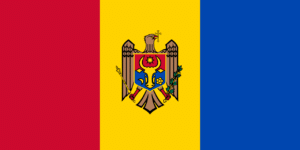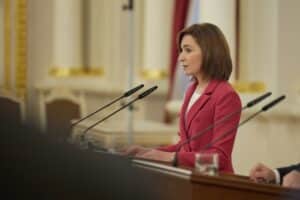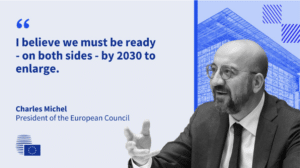After the country’s state of emergency was lifted by the Constitutional Court on April 28, President Maia Sandu responded immediately by dissolving parliament and announcing early elections for July 11. Since her elections as president in November of 2020 it has been in Sandu’s interest to trigger early parliamentary elections. However, her rival, former President Igor Dodon, had been doing everything in his power to prevent this from happening. His Party of Socialists of the Republic of Moldova (PSRM) is expected to lose to Sandu’s Party of Action and Solidarity (PAS). Win a potential election win, the pro-Western president will be finally able to implement genuine reforms and put an end to the country’s ongoing political crisis.
Ongoing political crisis since 2019 parliamentary elections
Dodon’s PSRM became the largest party in the 2019 parliamentary elections, but failed to gain a majority of the seats. In an effort to prevent the Democratic Party of Moldova (PDM), which was widely considered to be backed by the country’s oligarchs, from maintaining power, the PSRM and PAS formed an unlikely alliance. They had to set aside their differences on Moldova’s ties with the West and the East. However, a power struggle and political crisis followed, with the sitting PDM government refusing to hand over power to the new coalition. When the new coalition was finally installed, the crisis seemed to have been resolved.
Sandu was installed as Prime Minister and led a short-lived unstable government. She promised closer ties with the EU, but this was a difficult issue. The country that is wedged between Ukraine and EU member Romania has long been divided about whether to seek closer ties to the West, or maintain its traditional friendly relations with Russia. Former President Dodon and his PSRM were regarded as pro-Russian. It was no surprise when the government fell within five months. When the coalition collapsed, a PSRM-led pro-Russian government took control of Moldova. This could have meant the end for Sandu and her in 2016 established PAS.
Power struggle emerged after Sandu becomes president
Sandu decided to make a reappearance in the November 2020 presidential elections. In the second round, she gained 58% of the votes, against 42% of the votes for incumbent President Dodon. The results gave Sandu a strong mandate to seek closer ties with the West and with the EU, as Moldova’s first female president. The pro-Russian government led by former Prime Minister Ion Chicu quickly resigned. However, her PAS party only had 15 seats in parliament, out of a total of 101 seats. With 37 seats the PSRM still largely controlled parliament and the formation of a government that was led by Sandu’s PAS movement was nearly impossible.
Given the weak position of the PAS, but the fact that it was doing well in the polls, it was in the interest of Sandu to look for ways to hold early elections. As the PSRM would lose much of its power if parliamentary elections would take place, Dodon has been doing everything in his power to prevent them from taking place and delay them as much as possible. If there was not government 90 days after Sandu’s instalment, she could trigger snap elections. The prime ministers and government formation processes that Sandu initiated were, as expected, rejected by the PSRM. When the 90 days came close, Dodon pulled another trick down his sleeve.
State of emergency prevented early elections from being called
A national state of emergency was declared by Moldova’s parliament, as a consequence of high COVID-19 infection rates. No early election were allowed to take place. On March 31 parliament voted to introduce a 60-day state of emergency, which Sandu’s PAS movement strongly opposed. She claimed that it was merely politically motivated and “not a sign of concern for people’s health and lives“. When COVID-19 cases started dropping quickly, more and more question marks could be put on the state of emergency. A Constitutional Court ruling would take place on April 28 to evaluate whether the state of emergency was still appropriate. With COVID-19 infections at an acceptable level, Dodon and his PSRM felt the pressure increase.
In the final week before the Court ruling, in an assault on the justice system, a parliamentary majority led by the PSRM terminated the mandate of Constitutional Court’s president, Domnica Manole. This sparked protests, while President Sandu and the PAS cried foul. The attack also came shortly after the Constitutional Court had declared that Sandu was allowed to dissolve parliament and call early elections. It did not matter in the end. On April 28 the Constitutional Court still divisively ruled that the state of emergency instituted by lawmakers was unconstitutional. It was immediately abolished, paving the way for Sandu to dissolve parliament. She did so the same day, also announcing early elections taking place on July 11.
The expected PAS win could mean an end to the political crisis
It is yet unsure how big the PAS win is going to be, but it seems quite certain that the party will drastically increase its number of seats. In a recent IRI poll, the PAS led by a considerable margin over the PSRM, with 33% of the vote versus 19%. However, in this poll, many Moldovans also declared that they were undecided. Other polls even suggest that the PAS could win between 40% and 43% of the votes. Sandu’s main rival, the PSRM, might also still win between 33% and 38% of the votes. What is clear, is that the election will drastically alter Moldova’s political landscape. The position of the PAS is only expected to improve.
After July 11, Sandu might be able to install a more pro-Western government and could start implementing genuine reforms, especially when it comes to the judiciary. Moldova remains one of Europe’s poorest countries and is struck hard by the COVID-19 pandemic. It lacked resources to finance lockdowns. Moldova’s GDP also decreased by 7% last year, according to the International Monetary Fund (IMF). It will be difficult for Sandu to address the country’s health and economic crisis, but with the announcement of early elections, the political crisis might finally be resolved. “Power is in the hands of the people now”, Sandu said. It could not have been more fitting after two years of political power struggles and infights.
Image: Wikimedia (Official visit of Maia Sandu to Ukraine, 2021)
Sources: Aljazeera, Euronews, Rferl1, Rferl2, Intellinews



